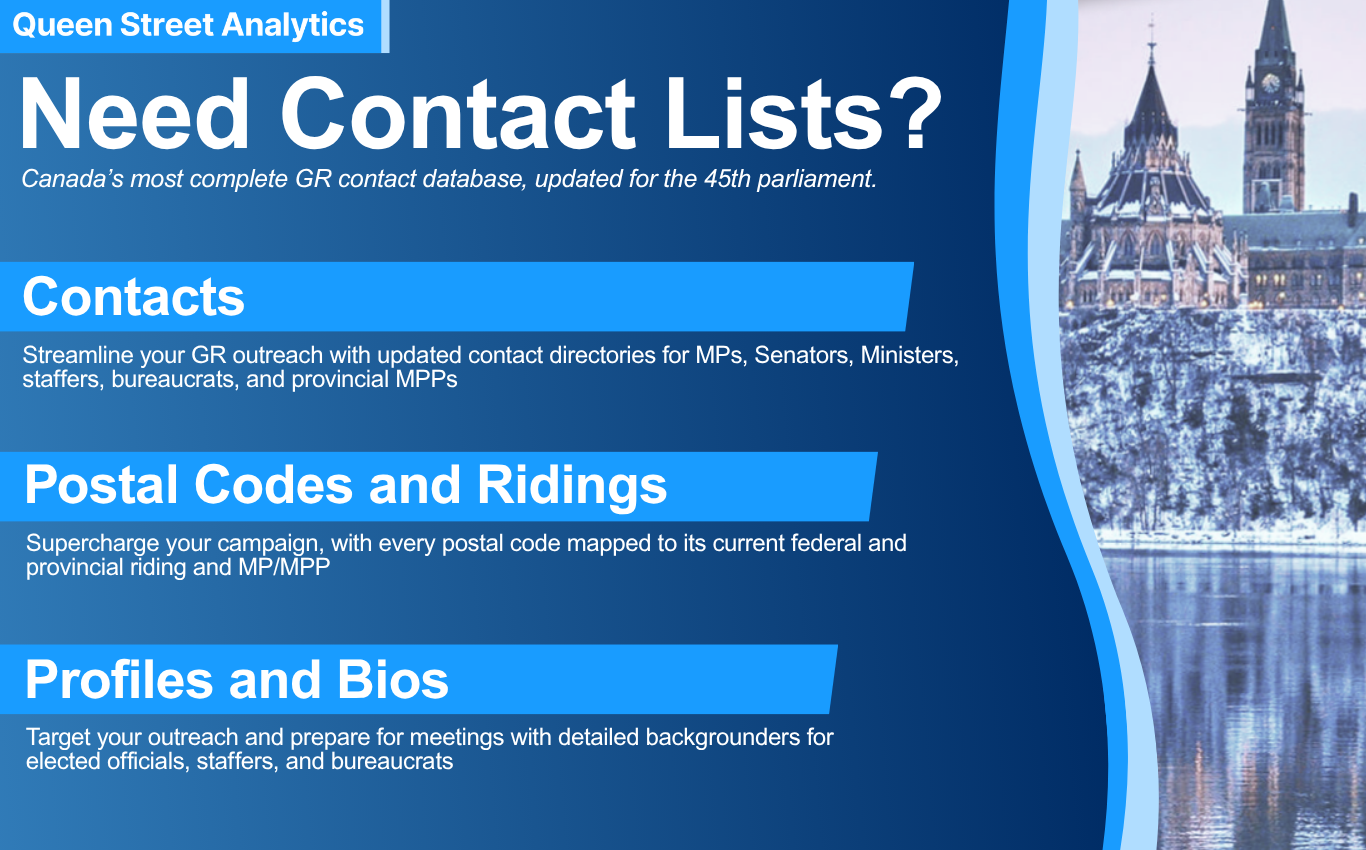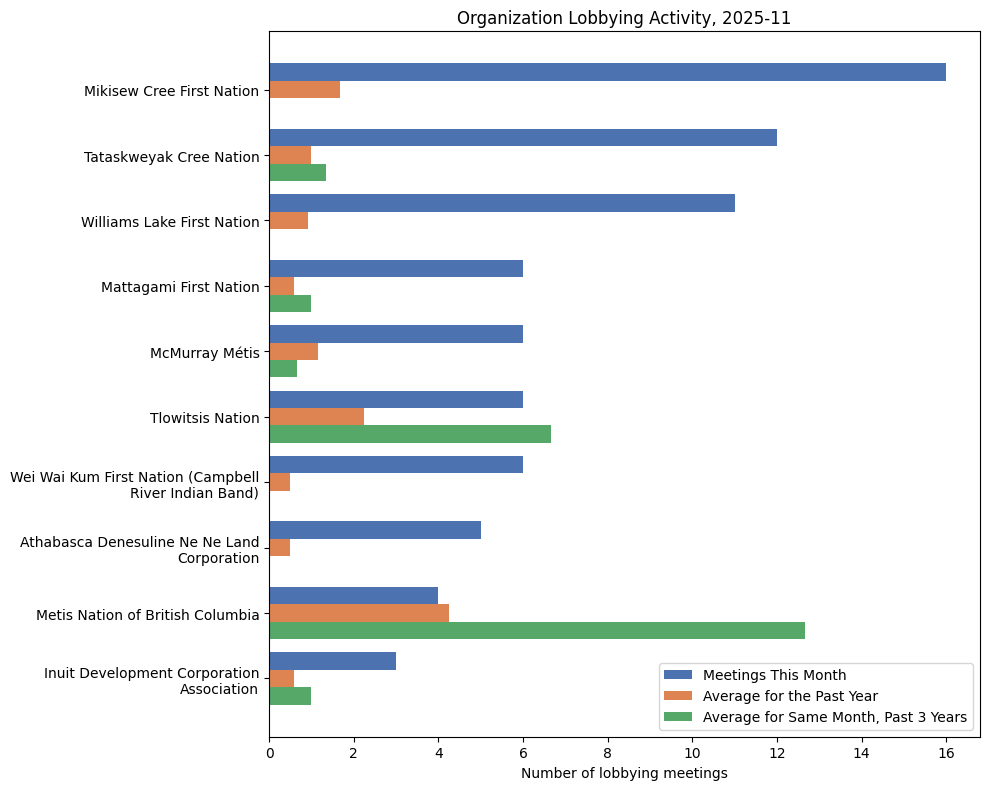QSA's Week in Indigenous Affairs (#45, 2025)
Feds refer major Indigenous-led hydro project in Nunavut to Major Projects Office; Ottawa highlights Indigenous participation at COP30; CRTC details broadband expansion, Indigenous engagement; Okanese First Nation opens new water plant; US BOEM seeks input for mineral leasing in Northern Mariana ...

Good morning! This is Queen Street Analytics' weekly roundup of regulatory developments, legislative discussions, political announcements and other government-related news concerning Indigenous communities, First Nations, Inuit, and Métis, and their reserves, territories, and treaty rights. Every Monday, we break down the most important updates in this space in under five minutes.
Want to see GR activities in areas related to Indigenous Affairs? Don’t miss this week’s updates in Social Issues and Environment.
Dates: 2025-11-09 to 2025-11-15
📋 In This Week's Newsletter
• 🏛️ This Week's Parliamentary Calendar
• 🇨🇦 Canadian Federal Government News
• 🗺️ Canadian Provincial Government News
• 🇺🇸 US Federal Government News
• 💬 Government Consultations
• 📚 What We're Reading This Week
This Week's Parliamentary Calendar
- House of Commons – Indigenous and Northern Affairs: Briefing on Budget 2025: On November 17, the Indigenous and Northern Affairs Committee will receive briefings on Budget 2025 from Ministers Rebecca Alty, Rebecca Chartrand, and Mandy Gull-Masty, along with senior officials from Indigenous Services Canada and Crown-Indigenous Relations and Northern Affairs.
- House of Commons – Indigenous and Northern Affairs: Indigenous Policing and Public Safety: On November 19, the Committee meets to examine Indigenous policing and public safety, with witness testimony expected from Chiefs of Police from Garden River First Nation, United Chiefs and Councils of Manitoulin, Treaty Three, Anishinabek, and Six Nations Police Services, as well as the Manitoba Métis Federation and the Stl'atl'imx Tribal Police Service.
- Senate – Standing Committee on Indigenous Peoples: Bill S-2, Indian Act Amendments: On November 18, the Senate Committee on Indigenous Peoples will hold clause-by-clause consideration of Bill S-2, which would amend the Indian Act with regard to new registration entitlements.
- Senate – Standing Committee on Indigenous Peoples: Agenda to Follow: The Senate Committee on Indigenous Peoples has a meeting scheduled for November 19, with the agenda to be announced. The meeting will use videoconference format.
- Senate – Standing Committee on Social Affairs, Science and Technology: Youth National Strategy and Métis Testimony: On November 20, the Senate Social Affairs Committee examines Bill S-212 on a national strategy for children and youth, with testimony scheduled from David Chartrand, President of the Manitoba Métis Federation, among other witnesses.
- House of Commons – Fisheries and Oceans: Review of the Fisheries Act with Indigenous Participation: On November 18, the Fisheries and Oceans Committee continues its review of the Fisheries Act. Assembly of First Nations representatives are scheduled among witnesses for the second session.
- House of Commons – Fisheries and Oceans: Review of the Fisheries Act Featuring Indigenous-Led Stewardship: On November 20, the Committee will hear from the RAD Network, which advises on Indigenous-led fish habitat stewardship, as part of ongoing studies on fisheries legislation.
- House of Commons – Canadian Heritage: Audit of Indigenous Art Collection: On November 19, the Canadian Heritage Committee will consider the audit of the Indigenous Art Collection, with testimony from Crown-Indigenous Relations and Northern Affairs officials.
Canadian Federal Government News
Iqaluit Nukkiksautiit Hydroelectric Project Referred to Major Projects Office
On November 13, the Government of Canada announced the referral of the Iqaluit Nukkiksautiit Hydroelectric Project to the Major Projects Office, positioning it as part of a wider initiative to channel over $55 billion in investment across nation-building infrastructure. The project, spearheaded by Nunavut Nukkiksautiit Corporation, will support hydroelectric development near Iqaluit, aiming to transition the city away from diesel power toward sustainable energy and enhancing local energy security. The project benefits from earlier federal investment through Northern REACHE and CanNor. As Nunavut's first fully Inuit-owned clean energy developer, the project features Inuit governance and ownership and is intended to serve as a model for community-driven clean power in Arctic regions. Minister of Crown-Indigenous Relations Rebecca Alty visited Iqaluit to mark the occasion. Ottawa described the investment as a generational step for Arctic sovereignty and economic growth, with forward-looking implications for Indigenous economic participation and local capacity-building.
Sources: www.canada.ca

Canada Showcases Indigenous Climate Leadership at COP30
At the 30th United Nations Climate Change Conference (COP30) in Belém, Brazil, Minister of Environment and Climate Change Julie Dabrusin led Canada’s delegation, where Indigenous climate leadership featured prominently at the Canada Pavilion’s Indigenous Climate Leadership Day on November 12. Federal representatives including Dabrusin and Minister Steven Guilbeault participated in sessions with First Nations, Inuit, and Métis partners, elevating Indigenous contributions within international climate frameworks. Canada endorsed the Tropical Forest Forever Facility declaration, reserving 20% of pledged funds for Indigenous groups, and joined the Global Initiative for Information Integrity on Climate Change to address climate misinformation. Prior to COP30, Canada also committed to global methane reductions and highlighted partnerships with Montréal-based GHGSat on international efforts to monitor and cut emissions. These international actions are positioned alongside ongoing domestic policies involving Indigenous engagement in climate and resource stewardship.
Sources: www.canada.ca
Federal, Provincial, and Territorial Ministers Convene with National Indigenous Organizations on Emergency Management
On November 13, federal, provincial, and territorial ministers responsible for emergency management met with leaders from national Indigenous organizations. While the Public Safety Canada announcement provided limited specifics, the meeting signals ongoing federal-provincial collaboration with Indigenous representatives regarding emergency preparedness. The dialogue forms part of intergovernmental engagement focused on disaster response and resilience in Indigenous communities.
Sources: www.canada.ca
Ministerial Remarks on Critical Minerals and Indigenous Partnerships in Nation-Building Projects
Natural Resources Minister Tim Hodgson, in speaking remarks delivered in Timmins, Ontario, on November 13, listed several newly referred projects to the Major Projects Office, including the Iqaluit Nukkiksautiit Hydro, Ksi Lisims LNG, and the Crawford Nickel mine, among others. Hodgson stressed that four out of seven projects involve critical minerals and underscored the direct participation of First Nations in agreements providing equity stakes in the Crawford Nickel Project. Taykwa Tagamou Nation invested $20 million for a meaningful ownership share. Strategic initiatives funded through Budget 2025 include a $2-billion Critical Minerals Sovereign Fund and a First and Last Mile Fund, with targeted tax incentives for minerals projects. Broader policy efforts are also expected to include Indigenous organizations in both infrastructure and mining supply chains.
Sources: www.canada.ca
Announcement of Upcoming Major Projects in Iqaluit
Minister Rebecca Alty provided advance notice of a significant announcement in Iqaluit on November 13, focusing on nation-building projects intended to strengthen economic linkages and Indigenous participation. The event was scheduled to take place at the Qulliq Energy Corporation power station.
Sources: www.canada.ca
Okanese First Nation Opens New Water Treatment Plant
On November 13, Indigenous Services Canada and Okanese First Nation (Treaty 4 Territory, Saskatchewan) marked the grand opening of a water treatment plant funded by an $11.8 million federal investment. The facility will serve community infrastructure including schools and 52 homes, with 29 homes connected to the water line and 23 to receive trucked water. The funding package includes a three-year training component for water treatment operators, supporting local operational capacity.
Sources: www.canada.ca
CRTC Addresses Broadband Fund, Indigenous Engagement, and Regulatory Reforms
In remarks delivered on November 13 at a rural and remote broadband conference, CRTC Commissioner Joanne Levy outlined recent developments in broadband funding for rural, remote, and Indigenous communities. Levy stated that approximately 750,000 Canadian households remain without broadband meeting the 50/10 Mbps standard, disproportionately impacting Indigenous populations. The CRTC Broadband Fund has provided over $750 million to date, and recent funding rounds include dedicated Indigenous streams and measures to streamline applications and Indigenous consent protocols. The CRTC is also preparing a fourth funding call and is consulting on procedures to improve network resiliency and outage compensation, while maintaining engagement with Indigenous partners through an expanded Indigenous Relations Team.
Sources: www.canada.ca
Canada Water Agency Issues Funding Call for Freshwater Projects Involving Indigenous Partners
On November 14, the Canada Water Agency opened several calls for applications under the Freshwater Ecosystem Initiatives and EcoAction program, supporting projects to restore aquatic habitats, improve water quality, and increase Indigenous engagement in freshwater management. Projects funded under these calls will enable community-led actions across Canada, with a focus on regions of national significance and activities that extend to Indigenous groups and partnerships.
Sources: www.canada.ca
Canadian Tourism Ministers Discuss Support for Indigenous and Cultural Tourism
Federal, provincial, and territorial tourism ministers met in Winnipeg on November 13–14 for the Canadian Council of Tourism Ministers meeting. The agenda included strategies for economic resilience, emergency management, and investment in both rural and Indigenous tourism offerings. Ministers affirmed the importance of transportation and infrastructure and renewed mandates for working groups into 2026, specifying a continued focus on collaboration with Indigenous communities in developing tourism products.
Sources: www.canada.ca
Canadian Provincial Government News
Métis Week Observed in Alberta
Alberta’s Minister of Indigenous Relations Rajan Sawhney issued a statement marking Métis Week, acknowledging the cultural and economic contributions of Métis communities and referencing annual commemorations of Louis Riel’s legacy.
Sources: www.alberta.ca
Cowichan’s New Hospital Adopts Dual Indigenous and English Name
The British Columbia government announced that the new Cowichan hospital will carry the Hul'q'umi'num' and English name Quw’utsun Valley Hospital/Quw’utsun Hulitun-ew’t-hw, recognizing Quw’utsun Peoples and incorporating Indigenous cultural elements throughout the facility.
Sources: news.gov.bc.ca
Manitoba Funds Programs for Victims and Families Impacted by Crime, Including Indigenous Initiatives
The Manitoba government allocated $750,000 from the Criminal Property Forfeiture Fund to victim services, including grants for Indigenous-led organizations supporting families of missing and murdered Indigenous women, girls, and two-spirit individuals.
Sources: news.gov.mb.ca
US Federal Government News
BOEM Requests Input for Mineral Leasing Offshore Northern Mariana Islands Including Indigenous Consultation
On November 12, the Bureau of Ocean Energy Management (BOEM) published a Request for Information regarding prospective commercial minerals leasing in the Outer Continental Shelf (OCS) offshore the Commonwealth of the Northern Mariana Islands. BOEM seeks comment on environmental, economic, and Indigenous community impacts—including those on Chamorro and Carolinian culture, sacred sites, and traditional resource use. The RFI process is mandated under several recent Executive Orders urging increased domestic critical mineral production. Interested parties can provide responses until December 12, 2025. BOEM indicates its intent to work closely with territorial governments and Indigenous communities throughout future leasing processes.
Sources: www.federalregister.gov
Government Consultations
CNSC Opens Consultation on Indigenous Engagement Guidelines
The Canadian Nuclear Safety Commission has issued a consultation on REGDOC-3.2.2 to clarify the expectations for licensees to engage Indigenous communities when projects potentially trigger Crown consultation obligations. The consultation is open through March 2026.
Sources: www.cnsc-ccsn.gc.ca
What We're Reading This Week
- Indigenous-led developments in housing scrutinized for market impact: Examines whether Indigenous-driven housing projects could influence Canada’s housing supply.
- Major nation-building project list draws some Indigenous support: Reports on Indigenous perspectives regarding new infrastructure project approvals.
- Pope returns 62 artifacts to Indigenous Canadians: Vatican hands over heritage items as part of reconciliation over colonial history.
- Cree reflect on Eeyou Istchee’s transformations since JBNQA: Interviews with Cree leaders on life before and after the James Bay and Northern Quebec Agreement.
- Indigenous veterans share experiences navigating service and discrimination: Profiles of Indigenous veterans facing challenges domestically and abroad.
- Indigenous participants featured at COP30 People’s Summit: Photo coverage of Indigenous involvement at parallel COP30 events.
- Toronto Indigenous centres express concern over federal budget’s potential funding impact: Centers in Toronto address operational uncertainty following the federal budget.
- Indigenous Services minister addresses budget worries: Minister discusses federal funding priorities with Indigenous communities.
- Media reports mixed Indigenous buy-in on major project list approvals: Carney says further Indigenous consent needed on infrastructure project list.
- National outlets cover Indigenous buy-in on new major projects list: CTV explores ongoing Indigenous engagement in national infrastructure initiatives.


